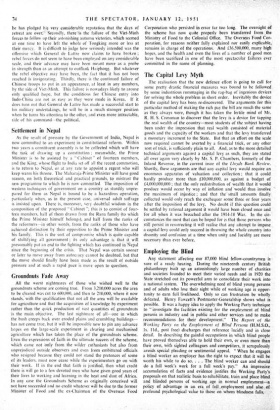The Capital Levy Myth
The realisation that the new defence effort is going to call for some pretty drastic financial measures was bound to be followed by some industrious rummaging in the rag-bag of ingenious devices for solving the whole problem in short order. Inevitably the device of the capital levy has been re-discovered. The arguments for this particular method of making the rich pay the bill are much the same as they always were, though it has taken the fertile mind of Mr. R. H. S. Crossman to discover that the levy is a device for tapping the real wealth of the country—most students of the subject having been under the impression that real wealth consisted of material goods and the capacity of the workers and that the levy transferred a monetary increment to the State. But that an effort on the scale now required cannot be averted by a financial trick, or any other sort of trick, is sufficiently plain to all. And, as to the more detailed technical arguments against a capital levy as such, they are stated all over again very clearly by Mr. S. P. Chambers, formerly of the Inland Revenue, in the current issue of the Lloyds Bank Review. Shortly, these arguments are that any capital levy would require an enormous apparatus of valuation and collection ; that it could hardly produce more than £10,000,000, as against a budget of £4,000,000,000; that the only redistribution of wealth that it would produce would occur by way of inflation and would thus involve the maximum of injustice ; and that the small amounts finally collected would only reach the exchequer some three or four years after the imposition of the levy. No doubt if this question could be settled by rational argument it would have been closed once and for all when it was broached after the 1914-18 War. In the cir- cumstances the most that can be hoped for is that those persons who still persist in resurrecting it will realise that any attempt to impose a capital levy could only succeed in throwing the whole country into disunity and confusion at a time when unity and lucidity are more necessary than ever before.


































 Previous page
Previous page